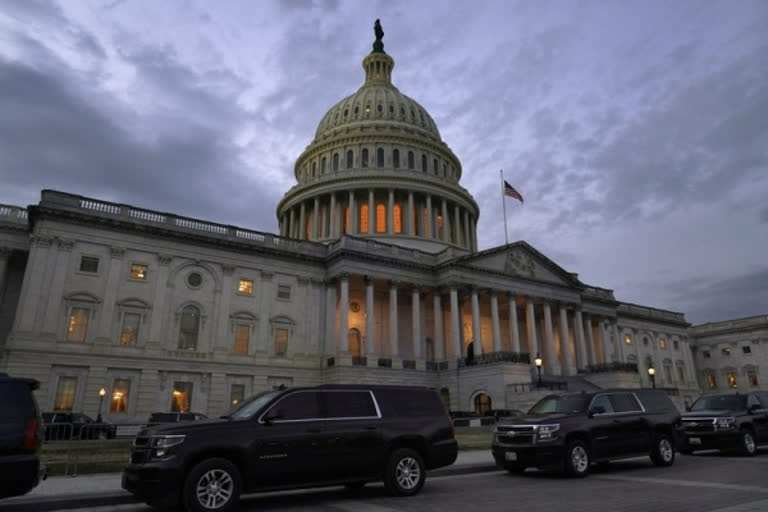WASHINGTON: Congress passed a $900 billion pandemic relief package that would finally deliver long-sought cash to businesses and individuals and resources to vaccinate a nation confronting a frightening surge in COVID-19 cases and deaths.
Lawmakers tacked on a $1.4 trillion catchall spending bill and thousands of pages of other end-of-session business in a massive bundle of bipartisan legislation as Capitol Hill prepared to close the books on the year. The bill approved Monday night went to President Donald Trump for his signature, which was expected in the coming days.
The relief package, unveiled Monday afternoon, sped through the House and Senate in a matter of hours. The Senate cleared the massive package by a 92-6 vote after the House approved the COVID-19 package by another lopsided vote, 359-53. The tallies were a bipartisan coda to months of partisanship and politicking as lawmakers wrangled over the relief question, a logjam that broke after President-elect Joe Biden urged his party to accept a compromise with top Republicans that is smaller than many Democrats would have liked.
The bill combines coronavirus-fighting funds with financial relief for individuals and businesses. It would establish a temporary $300 per week supplemental jobless benefit and a $600 direct stimulus payment to most Americans, along with a new round of subsidies for hard-hit businesses, restaurants, and theaters and money for schools, health care providers and renters facing eviction.
Read: Joe Biden receives Covid-19 vaccine jab publicly
The 5,593-page legislation — by far the longest bill ever — came together Sunday after months of battling, posturing and postelection negotiating that reined in a number of Democratic demands as the end of the congressional session approached. Biden was eager for a deal to deliver long-awaited help to suffering people and a boost to the economy, even though it was less than half the size that Democrats wanted in the fall.
“This deal is not everything I want — not by a long shot,” said Rules Committee Chairman Jim McGovern, D-Mass., a longstanding voice in the party’s old-school liberal wing. “The choice before us is simple. It’s about whether we help families or not. It’s about whether we help small businesses and restaurants or not. It’s about whether we boost (food stamp) benefits and strengthen anti-hunger programs or not. And whether we help those dealing with a job loss or not. To me, this is not a tough call.”
Congress also approved a one-week stopgap spending bill to avert a partial government shutdown at midnight and give Trump time to sign the sweeping legislation.
Treasury Secretary Steven Mnuchin, a key negotiator, said on CNBC Monday morning that the direct payments would begin arriving in bank accounts next week.
Democrats promised more aid to come once Biden takes office, but Republicans were signaling a wait-and-see approach.
The measure would fund the government through September, wrapping a year’s worth of action on annual spending bills into a single package that never saw Senate committee or floor debate.
The legislation followed a tortured path. Democrats played hardball up until Election Day, amid accusations that they wanted to deny Trump a victory that might help him prevail. Democrats denied that, but their demands indeed became more realistic after Trump’s loss and as Biden made it clear that half a loaf was better than none.
The final bill bore ample resemblance to a $1 trillion package put together by Senate Republican leaders in July, a proposal that at the time was scoffed at by House Speaker Nancy Pelosi, D-Calif., as way too little.
Majority Leader Mitch McConnell, R-Ky., took a victory lap after blocking far more ambitious legislation from reaching the Senate floor. He said the pragmatic approach of Biden was key.
“The president-elect suggesting that we needed to do something now was helpful in moving both Pelosi and Schumer into a better place,” McConnell told The Associated Press. “My view about what comes next is let’s take a look at it. Happy to evaluate that based upon the needs that we confront in February and March.”
Vice President-elect Kamala Harris, D-Calif., came to the Senate to cast her vote for the bill. “The American people need relief and I want to be able to do what I can to help them,” she said.
